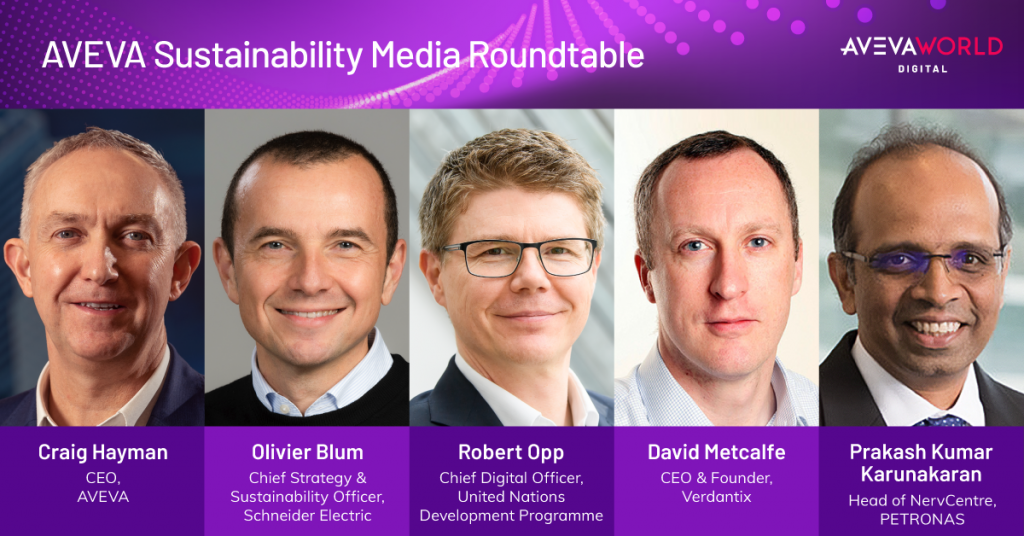 Global engineering and industrial software company AVEVA convened leaders from the United Nations Development Program (UNDP), Schneider Electric, PETRONAS and Verdantix in a virtual press panel session recently, to discuss how digitisation is driving the sustainability business agenda for industrial organisations. Participants highlighted how in the past year, the world had faced a challenge that is unique in history, in its scale and scope, and industries have been adversely affected in many ways. The key takeaway from the session was that 2021 is set to be a year of resiliency and renewed rebuilding, and Industry 4.0 will enable employees and communities to optimise sustainable processes to reduce carbon footprints.
Global engineering and industrial software company AVEVA convened leaders from the United Nations Development Program (UNDP), Schneider Electric, PETRONAS and Verdantix in a virtual press panel session recently, to discuss how digitisation is driving the sustainability business agenda for industrial organisations. Participants highlighted how in the past year, the world had faced a challenge that is unique in history, in its scale and scope, and industries have been adversely affected in many ways. The key takeaway from the session was that 2021 is set to be a year of resiliency and renewed rebuilding, and Industry 4.0 will enable employees and communities to optimise sustainable processes to reduce carbon footprints.
Session moderator Robert Opp, Chief Digital Officer at the UNDP, outlined the importance of organisations setting clear objectives for leveraging new technologies to align with the UN’s Sustainable Development Goals (SDGs). The Sustainable Development Goals are 17 interlinked global goals designed to be a ‘blueprint to achieve a better and more sustainable future for all’. The convergence of new technologies, such as Artificial Intelligence (AI), Cloud and Big Data & Analytics, is disrupting and creating opportunities across every industry. Opp highlighted how technological progress is key to finding lasting solutions to both economic and environmental challenges, from creating new employment opportunities to promoting energy efficiency.
“Promoting sustainable industries, and investing in scientific research and innovation, are all important ways to facilitate sustainable development,” said Opp. “Over the last few years there has been a major shift toward sustainability, and our mission at the UNDP is actively championed by technology organisations like AVEVA, who recognise the urgency to prioritise sustainable practices and also measure the multi-faceted benefits that reducing a company’s carbon footprint and being more efficient through technology, affords.”
AVEVA’s software has been driving sustainable outcomes for customers for years. The company’s goal is to provide customers with the real data they need to run their businesses efficiently, with the myriad of technological solutions it provides. Once the data is available, the process of being able to cohesively understand where the disconnects are and start doing something to remedy them begins.
Craig Hayman, CEO AVEVA, said, “While AVEVA is still at the beginning of its environmental journey, we have long aligned our business to the UN’s Sustainability Development Goals. It is no surprise, therefore, that we announced that we have partnered with the United Nations Global Compact Network, a voluntary platform for the development, implementation and disclosure of responsible business practices. The digitalisation of traditional manufacturing businesses has enabled AVEVA to provide its customers with software solutions that not only increase ROI, but also streamline their business models, in order to start to ‘frame’ their environmental plans. By providing customers with real-time data and supporting improved operational efficiency, AVEVA has the potential to help thousands of customers – some of whom have very sizeable carbon footprints – to significantly cut their energy consumption and emissions.”
According to Schneider Electric, there are only 10 years left to limit global temperature increase to 1.5 degrees and ever-increasing expectations for a better life and resilient business, good is not enough anymore. In January 2021, the company was ranked the world’s most sustainable corporation, in a prestigious annual list, announcing at the same time the acceleration of its own sustainability strategy and the launch of its climate change advisory services.
Schneider Electric’s Olivier Blum, Chief Strategy & Sustainability Officer, pointed out the importance of supporting the wave of net zero commitments from corporates with end-to-end solutions. “The momentum is huge. However only 4% of sustainability programs will make it over time without a robust strategy and a concrete plan to digitise, measure, implement and iterate. We have been on this journey ourselves for over 15 years saving million tons of CO2 for our customers along the way. With unique perspective and expertise, we are ready to go further and faster to help others succeed and sustain their digital transformation for efficiency and sustainability thanks to our best in class consulting teams.”
David Metcalfe, CEO of Verdantix, an Independent research and advisory firm with expertise in digital strategies for Environment, Health & Safety, ESG & Sustainability, Operational Excellence and Smart Buildings focused on the impact of sustainability on financial leaders. Metcalfe highlighted how today’s challenging environment for businesses has impacted on how they are approaching and prioritising sustainability, noting how this has shifted to equal importance as other business focused initiatives. “If we compare what happened during the financial crisis in 2008, where climate change and sustainability were pushed very far down in the agenda, it’s amazing just how rapidly these topics have risen back up the agenda in just a matter of months,” Metcalfe commented. “This is the difference between the ‘passive’ sustainability of yesterday compared to the shift in thinking that has occurred more recently.”
The panel was united in its observations that a principled approach to business and profits must go hand in hand with an organisation’s sustainability journey. The very essence of a sustainable future for the industrial sector lies in embracing common objectives such as those outlined in the UN Sustainable Development Goals and using a public-private sector collaborative approach to drive and create new opportunities for a greener world today.
Hayman concluded, “Adopting a universal approach to drive sustainable outcomes will enable the industrial sector to develop sustainability goals in line with other sectors, including on carbon neutrality. At AVEVA, we’re proud to be working with our customers, alliances and partners to embrace the digital tools that will allow them to manage and measure their footprint. We are focused on where our contribution can be greatest – affordable and clean energy, industry innovation and infrastructure, sustainable cities and communities and clean water and sanitation.”










Discussion about this post